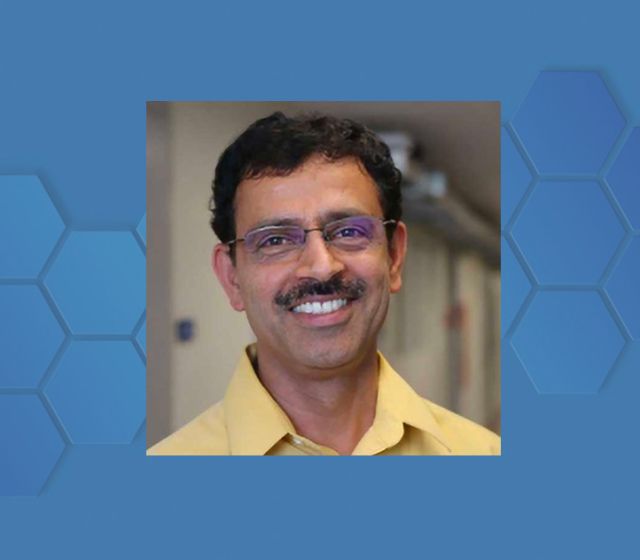Manjunath: Graduate Mentor
ECE Prof. B.S. Manjunath receives a UCSB Academic Senate Outstanding Graduate Mentor Award

Excerpt from the COE News article – "Two of Three Outstanding Graduate Mentor Awards Go to COE Professors"
Two faculty members in the UC Santa Barbara College of Engineering have received Outstanding Graduate Mentor Awards for 2024-’25 academic year. Electrical and computer engineering professor B. S. Manjunath and Computer science professor Christopher Kruegel each received a mentor award, with a third award going to English professor Ben Olguín.
“This is an outstanding recognition for B. S. Manjunath and Chris Kruegel,” said Umesh Mishra, dean of the College of Engineering. “Both of them have guided a large number of students toward their professional goals, demonstrating patience and empathy while challenging them to achieve superior levels of expertise in their fields. Congratulations to them on this well-deserved award.”
Upon receiving news of his faculty mentoring award, Manjunath said, “To me, mentorship is a lifelong commitment to nurturing curiosity, critical thinking, and resilience in students. My primary goal is to foster an inclusive environment in which students can grow into independent researchers and future leaders. I view mentoring as a partnership — an ongoing dialogue that goes beyond solving technical problems to helping students build confidence, integrity, and a collaborative spirit.
"I’m deeply honored and grateful for this recognition. Mentoring has been one of the most rewarding parts of my career — watching students grow, find their paths, and make a difference in the world is an incredible privilege," added Manjunath, who directs the Vision Research Lab, the Center for Bio-image Informatics, and the Center for Multimodal Big Data Science and Healthcare at UCSB.
Manjunath’s approach to mentoring rests on three core values: individualized support, interdisciplinary exploration, and long-term impact. “Because computer vision now touches nearly every aspect of modern life, from scientific research to consumer applications, it provides an exceptional arena for students of varied backgrounds to collaborate and flourish,” he says. “This inherently interdisciplinary field offers high-impact opportunities in healthcare, environmental sustainability, digital media, and more. By tailoring my guidance to each student’s unique skill set and goals, I try to encourage the development of not only technical expertise, but also creativity, perseverance, and ethical research practices. Recognizing that some students thrive under structured guidance while others excel with greater independence, I adapt my approach to cultivate both autonomy and confidence.”
In the highly supportive environment of the Vision Research Lab, Manjunath guides students as they navigate the full range of academic and professional challenges while supporting them in defining research problems clearly and taking the time to think critically rather than rushing to solutions.
During his thirty-three years of tenure at UCSB, Manjunath has advised fifty-two PhD students through their dissertations.” Many of those students have leveraged computer vision in digital multimedia, biomedical imaging, materials science, neuroscience, and biodiversity, which, Manjunath believes, reflect his “commitment to interdisciplinary learning and the transformative potential of diverse perspectives.”
Manjunath believes in taking risks, and says that a key aspect of his mentorship lies in “inspiring students to be bold in their research vision and to think ambitiously about the impact they can have,” he says. “By working closely with students to refine proposals, strengthen communication skills, and cultivate forward-thinking mindsets, I strive to guide them toward innovative projects that will have lasting significance.”
Two of his doctoral students — Satish Kumar and S. Shailja (both PhD ’24) — became finalists for the globally contested Schmidt Science Fellowship, which is awarded to only about forty fellows worldwide across all science and engineering disciplines. Kumar ultimately received the fellowship in 2024 for his work on environmental sustainability, becoming the first PhD student from the College of Engineering to earn that honor, while Shailja received UCSB’s 2024 Lancaster Dissertation Award in Science and Engineering.
Over the years, Manjunath's mentorship has propelled many students to leadership roles across academia, industry, and entrepreneurship, where they have had profound impacts in their fields. They include: Wei-Ying Ma (PhD ’96), now a Huiyan Chair Professor and Chief Scientist at Tsinghua University in China, who previously founded and led the AI Lab at ByteDance, driving core technologies behind TikTok and other transformative platforms; Marco Zuliani (PhD ’06), who works in advanced computer vision technologies at Apple; and Kaushal Solanki (PhD ’05), who founded EyeNuk, which pioneered AI-powered, FDA approved technology for detecting diabetic retinopathy. Many other of his students have assumed influential roles at Google, Amazon, and Meta, or founded successful startups of their own. For example, Satish Kumar (PhD ’24) and current PhD student Bowen Zhang co-founded EyeClimate, a company leveraging advanced AI and data analytics to develop impactful solutions for climate change. They also led their team to first place at UCSB’s 2024 New Venture Competition.
Manjunath says that he sees mentorship as “a two-way exchange” that benefits him as much as it benefits his students. “Every student I guide broadens my own horizons, whether by questioning established thinking, suggesting novel approaches, or offering fresh insights into our shared research. This reciprocal process continually refines my own mentoring style, keeping me open to new possibilities for student growth and collaboration.
A willing listener, Manjunath encourages students to contribute their ideas, even those they are unsure of. His ability to listen, which “empowers new students to share their perspective, regardless of any naiveté,” one student said, “remains one of the most powerful lessons anyone can learn. What I enjoy most is that he never states truths; he simply demonstrates them, so that we learn by example.”
“Mentoring remains one of the most fulfilling aspects of my academic career,” Manjunath concludes. “Observing students evolve into confident scholars, creative thinkers, and successful professionals is both humbling and inspiring.”
COE News – "Two of Three Outstanding Graduate Mentor Awards Go to COE Professors"